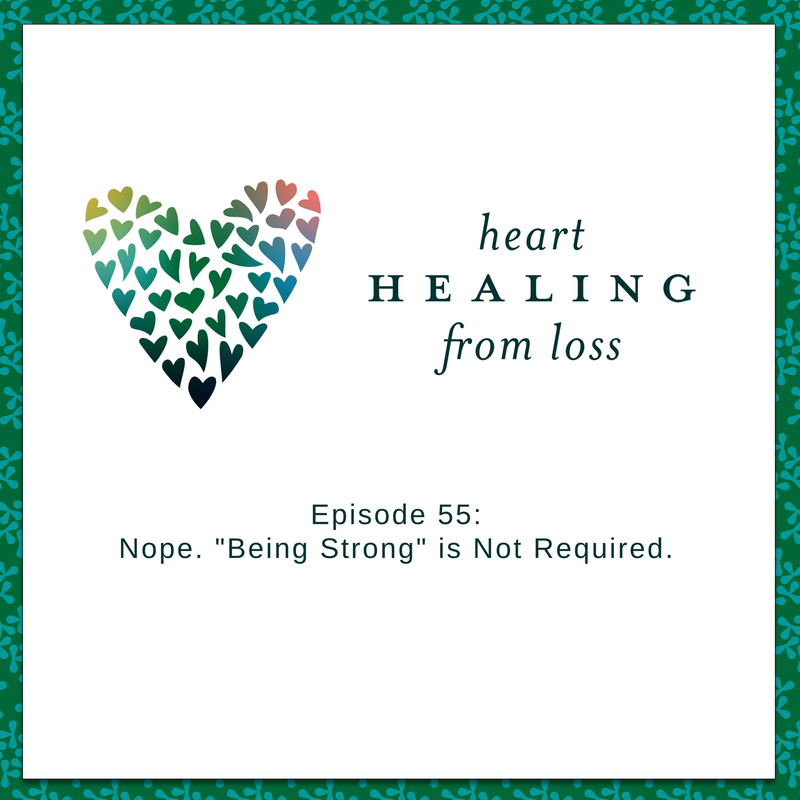Episode 55: Nope. Being Strong is Not Required
|
Nope.
You do not have to be strong when going through grief and loss. Sometimes, doing the best you can today is all you have the capacity for. And that’s enough. Grief and navigating loss have nothing to do with strength. Sometimes “being strong” can actually prolong your pain because the defenses go up. The ability to feel your feelings also has nothing to do with strength. It is time to reframe So, instead of thinking of it as being strong for yourself or others, reframe it instead, to “finding your power again.” Seeking help and support and doing the work is where your power can come from. TL:DR? Don’t resist it — don’t try to be strong. Let yourself feel your feelings. Find support to find your power. This is the first step — and congratulations, because you are here doing the work already! The journey to finding your power has already begun. |
You are Invited
If you're ready for next steps, to build toward what you're really wanting in life, listen to the episode, then contact host Grief Coach Wendy Sloneker for a complimentary consultation. You'll find her at her website, wendysloneker.com.
If you're ready for next steps, to build toward what you're really wanting in life, listen to the episode, then contact host Grief Coach Wendy Sloneker for a complimentary consultation. You'll find her at her website, wendysloneker.com.
As seen on: |
|
Full Episode Transcript
Wendy Sloneker
Hello, you are listening to the Heart Healing from Loss podcast with Wendy Sloneker. We've made it to Episode 55 and counting
Hi, everyone. Glad you are here. I am glad to be with you. Right inside your little ears. Yes. And nope. Nope. To the following. Nope. You do not have to be, quote, strong. When you are going through grief and loss. I'm going to have a couple of things to say about this weighty and weighty and on talked about not normalized topic.
Okay, what am I saying? So no, you you don't have to be, quote, strong. I've mentioned this in other episodes, I think before, but this really does merit its own time. Because people are confused. And already in pain. It's already hard enough. So I want to talk first about when, let's say you're experiencing tremendous change, tremendous loss, lots of feelings, that brain fog that descends that is 100%. Your body's protection. When you're going through a lot of change and, and emotion, honestly.
When other people say you're doing so great, you've you've seemed so strong. This is what they say. And this is something that they may or may not like I don't know what it is they're thinking that that comes up for them. It could be that they were trained to say that I've certainly said it before I started doing anywhere near this work. Oh my gosh, you seem like when you know honestly, nobody knows how it feels. And it's often easier for we as the Grievers to, like send our representative, as I like to say, like, Yeah, I'm calling it in, because I'm not going there with this group, or I don't have capacity to feel this raw. So I'm going to put some shields up, I'm going to put some guards up emotionally, this is the best I can do. And then we're going to leave early and come home and go to bed. This is reasonable.
Whatever they are saying is not about you. They have no idea. And you can totally hashtag they have no idea. Also, hashtag understatement. Because they don't there's no way that they could, there's no way that they could the whole you. You need to be strong for the kids or you need to be strong for your spouse or you need to be strong for your mom. Like, it's not actually possible to be that for someone else.
That is where we check out of our humanity and into like the robotic service provider who's like all about the doing and not the being tarred. When we try to be strong even for ourselves, we end up more lonely and more isolated. Over time. We do it's not wrong. Sometimes there are places and times where you want to go ahead and give the the sense of or the feeling of I'm okay right now, in this moment. This is this is also fine, even if you don't feel it.
We, as humans, like we want to be feeling acceptable feelings and having, you know, like this whole concept is loaded. It's loaded. So before I go any further on this, I do want to say that no, you don't have to be strong. I want to reinforce that because oftentimes people say that and when it's been said to me in some of my hardest moments. I certainly have not felt strong.
And I had the idea that they weren't seeing me when honestly they really just did not have any idea what else to say. It sounds like it would be so great to say it but it's it's an thought. And there are lots and lots of people in this world who just have well intentioned thoughts, but they don't know how it lands, because they have no idea what we as Grievers go through, or what you may be going through in a particular moment around a certain relationship.
This, you know, it's painful, it can be really painful, and it can feel like they're not seeing you at all. And you can choose whether or not you're going to have the conversation, none of that's actually the last thing that I feel is strong.
That's up to you and your emotional capacity, you certainly do not have to this is not a space of have to or should. But you have that choice and that power to go there. Or let the representative handle it. And just get along with doing the best you can for today. Because that's good enough to that's good enough.
I want to talk a little bit, also about when we have the idea, and we hold the idea so closely and so tightly that we really should be strong. There's there was somebody I spoke to a number of weeks ago who kind of had some tremendous change that involve some additional unexpected family of origin, we'll call them dynamics. Dynamics came up like people were not pleased, and this person was already going through a lot and their world was rocked. It was rocked, and now they had this additional sort of uncomfortableness and disappointment in the relationship.
But also, the phrase that they said that I've been kind of noodling with again and again, is I thought I was a strong person. So they've taken this whole, like experience of what they're going through, and they've made it infinitely harder on themselves. By telling themselves that they're, in essence, maybe they're doing it wrong, or maybe they're not the person I thought they were. Grief has nothing to do with strength.
I'm gonna say that one more time, grief, and navigating loss, have nothing to do with strength. If anything strength, in the way that we use it, to resist feeling our feelings in the society and age, it is not helping us. It is actually prolonging our own pain, by we tend to, here's how we do this. We tend to like muscle up or shields up. And even with ourselves, even in safe moments, because maybe it's a habit. Maybe it's a pattern. Maybe it's reinforced, because it's what we see other people doing are saying, and we think we should.
So we take short term distractions, and apply them not really giving any consideration to long term, or the fact that we'll need to feel that feeling that we just sort of like blocked or punted, or did whatever sports thing, reference. You want, we blocked it, we resisted it. And now it's like buried somewhere energetically. We fend it off short term.
The thing is, we don't realize in that moment that we're going to need to feel that feeling at some point. Because it is a stored kind of energy in our body or in our brain. It's that moment where our subconscious can take it and be like, Okay, later, okay, I'll just pop it back up at some inconvenient moment. You'll probably be in public. Good luck. So that's been my experience personally. So do I want to feel this now or do I want to feel this later?
Again, this has nothing to do with strength or the ability to feel a feeling the thing is about feeling feelings. We haven't been Todd how to do it. So this is where we collectively are at a disadvantage. And seeking help and support like you're doing exactly right now in our work together on this podcast, I do feel like we're working together when you're listening to my podcast, heck, yes.
So the work is already beginning, you having a different set of information, more details, more options and choices is where your power can come from. You don't have to resist, you don't have to be strong. I do recommend like mentioning, either to yourself in writing. Because that's often where we can sort of download our brains to a page that is non judgmental. We are the ones who are judgmental of ourselves. And we can look at what's going on in our minds when we write it down. I recommend writing, or I recommend, like finding and working with a trusted person doesn't mean you have to pay them. No, it does not. Does it mean they should be trusted? Yes, it does. That's the critical point. They need to be someone that you trust, emotionally, someone you can be specific with. And someone that is not going to judge you or, you know, bring out your best representative is what my, my suggestion would be.
Now, like I do this with my clients, I teach how to feel a feeling. And then and then we go on to practice that with their real life experiences. This is for healing. And this is for just a better result and outcome, one that is guided one that is supported. The thing is like, we have a society as well, who's really into DIY, do it yourself, or DIM do it myself. So we say in our brains that, you know, yeah, I don't need help with that. I just need to learn how to feel my feelings and then feel them.
Ultimately, this is totally true. Ultimately, this is 100% accurate. It doesn't have to take a long time and support may ease the process. It may not be what you think it is. I'm going to drop right now that for me, anticipation of going through grief work was the worst of it. The actual doing of the work, some moments were really hard. And with support, I was able to go through it more quickly have more capacity, feel not not so much like myself again, which is what I think a lot of people want to feel but I felt good about and satisfied and more confident in the feelings that would come up that I would be able to feel them or handle them getting better at it and then feeling more myself. That totally came shortly after. Confidence and satisfaction came first healing of the the circumstance or healing of my thought about the circumstance that came before the confidence it's possible to heal without having to be strong.
And if someone's pressuring you to, quote unquote, be strong so that they can perceive you as strong. It's an option to minimize your connection with that person even for a little while, even to end the call a little bit early. Even to say I'm not really offering that right now. Let's try again in a few weeks. This is possible.
This is a heavy topic. I expect it to come up again and some more and again, it's more heck there might even be in another episode all about it. Because it is loaded. I hope this has been useful to you for a few moments, our time together. I appreciate you. It's hard enough and you are doing it.
This is what doing it looks like this is what doing it feels like it might be really awful. And then at some moment, I want to encourage you to look for the moment where it feels kind of flat but not so intense. Those moments are there to can to encourage you to look for those. That's when I looked for in my really hard seasons.
Don't forget rest, have some distraction, some fun, something silly. And then keep doing this work because you're doing it okay. Really, really excellent. Leave me a comment connect with me with questions if you want to do a connection call. I'm super up for that. I have a little time in my schedule right now. And, and more is on the way. This is not the destination. This is just a moment at a time. Okay, hang in there. I'm thinking of you. Take sweet sweet care. Okay, bye.
Hi, this is Wendy, thank you so much for being here and spending time with me. For you. Yeah, the whole purpose of walking through grief and loss is to find out how to feel better. Did you know there are tools and skills to be learned about how to do this? Yeah, for real, and I do it. Let's get on a connection calm. It's a 45 minute free call. We'd love to offer to you when you're ready. And we'll just see if we'd be a good fit to work together. If you're ready for a little more support, and not less, and if you're ready to feel a little bit better. And to find out how to learn these tools and skills. I'm ready for you. Reach out through my website. Connect with me directly for [email protected] and we'll set it up.
Heck yeah, we will. All right. Till then take really good care.
Hello, you are listening to the Heart Healing from Loss podcast with Wendy Sloneker. We've made it to Episode 55 and counting
Hi, everyone. Glad you are here. I am glad to be with you. Right inside your little ears. Yes. And nope. Nope. To the following. Nope. You do not have to be, quote, strong. When you are going through grief and loss. I'm going to have a couple of things to say about this weighty and weighty and on talked about not normalized topic.
Okay, what am I saying? So no, you you don't have to be, quote, strong. I've mentioned this in other episodes, I think before, but this really does merit its own time. Because people are confused. And already in pain. It's already hard enough. So I want to talk first about when, let's say you're experiencing tremendous change, tremendous loss, lots of feelings, that brain fog that descends that is 100%. Your body's protection. When you're going through a lot of change and, and emotion, honestly.
When other people say you're doing so great, you've you've seemed so strong. This is what they say. And this is something that they may or may not like I don't know what it is they're thinking that that comes up for them. It could be that they were trained to say that I've certainly said it before I started doing anywhere near this work. Oh my gosh, you seem like when you know honestly, nobody knows how it feels. And it's often easier for we as the Grievers to, like send our representative, as I like to say, like, Yeah, I'm calling it in, because I'm not going there with this group, or I don't have capacity to feel this raw. So I'm going to put some shields up, I'm going to put some guards up emotionally, this is the best I can do. And then we're going to leave early and come home and go to bed. This is reasonable.
Whatever they are saying is not about you. They have no idea. And you can totally hashtag they have no idea. Also, hashtag understatement. Because they don't there's no way that they could, there's no way that they could the whole you. You need to be strong for the kids or you need to be strong for your spouse or you need to be strong for your mom. Like, it's not actually possible to be that for someone else.
That is where we check out of our humanity and into like the robotic service provider who's like all about the doing and not the being tarred. When we try to be strong even for ourselves, we end up more lonely and more isolated. Over time. We do it's not wrong. Sometimes there are places and times where you want to go ahead and give the the sense of or the feeling of I'm okay right now, in this moment. This is this is also fine, even if you don't feel it.
We, as humans, like we want to be feeling acceptable feelings and having, you know, like this whole concept is loaded. It's loaded. So before I go any further on this, I do want to say that no, you don't have to be strong. I want to reinforce that because oftentimes people say that and when it's been said to me in some of my hardest moments. I certainly have not felt strong.
And I had the idea that they weren't seeing me when honestly they really just did not have any idea what else to say. It sounds like it would be so great to say it but it's it's an thought. And there are lots and lots of people in this world who just have well intentioned thoughts, but they don't know how it lands, because they have no idea what we as Grievers go through, or what you may be going through in a particular moment around a certain relationship.
This, you know, it's painful, it can be really painful, and it can feel like they're not seeing you at all. And you can choose whether or not you're going to have the conversation, none of that's actually the last thing that I feel is strong.
That's up to you and your emotional capacity, you certainly do not have to this is not a space of have to or should. But you have that choice and that power to go there. Or let the representative handle it. And just get along with doing the best you can for today. Because that's good enough to that's good enough.
I want to talk a little bit, also about when we have the idea, and we hold the idea so closely and so tightly that we really should be strong. There's there was somebody I spoke to a number of weeks ago who kind of had some tremendous change that involve some additional unexpected family of origin, we'll call them dynamics. Dynamics came up like people were not pleased, and this person was already going through a lot and their world was rocked. It was rocked, and now they had this additional sort of uncomfortableness and disappointment in the relationship.
But also, the phrase that they said that I've been kind of noodling with again and again, is I thought I was a strong person. So they've taken this whole, like experience of what they're going through, and they've made it infinitely harder on themselves. By telling themselves that they're, in essence, maybe they're doing it wrong, or maybe they're not the person I thought they were. Grief has nothing to do with strength.
I'm gonna say that one more time, grief, and navigating loss, have nothing to do with strength. If anything strength, in the way that we use it, to resist feeling our feelings in the society and age, it is not helping us. It is actually prolonging our own pain, by we tend to, here's how we do this. We tend to like muscle up or shields up. And even with ourselves, even in safe moments, because maybe it's a habit. Maybe it's a pattern. Maybe it's reinforced, because it's what we see other people doing are saying, and we think we should.
So we take short term distractions, and apply them not really giving any consideration to long term, or the fact that we'll need to feel that feeling that we just sort of like blocked or punted, or did whatever sports thing, reference. You want, we blocked it, we resisted it. And now it's like buried somewhere energetically. We fend it off short term.
The thing is, we don't realize in that moment that we're going to need to feel that feeling at some point. Because it is a stored kind of energy in our body or in our brain. It's that moment where our subconscious can take it and be like, Okay, later, okay, I'll just pop it back up at some inconvenient moment. You'll probably be in public. Good luck. So that's been my experience personally. So do I want to feel this now or do I want to feel this later?
Again, this has nothing to do with strength or the ability to feel a feeling the thing is about feeling feelings. We haven't been Todd how to do it. So this is where we collectively are at a disadvantage. And seeking help and support like you're doing exactly right now in our work together on this podcast, I do feel like we're working together when you're listening to my podcast, heck, yes.
So the work is already beginning, you having a different set of information, more details, more options and choices is where your power can come from. You don't have to resist, you don't have to be strong. I do recommend like mentioning, either to yourself in writing. Because that's often where we can sort of download our brains to a page that is non judgmental. We are the ones who are judgmental of ourselves. And we can look at what's going on in our minds when we write it down. I recommend writing, or I recommend, like finding and working with a trusted person doesn't mean you have to pay them. No, it does not. Does it mean they should be trusted? Yes, it does. That's the critical point. They need to be someone that you trust, emotionally, someone you can be specific with. And someone that is not going to judge you or, you know, bring out your best representative is what my, my suggestion would be.
Now, like I do this with my clients, I teach how to feel a feeling. And then and then we go on to practice that with their real life experiences. This is for healing. And this is for just a better result and outcome, one that is guided one that is supported. The thing is like, we have a society as well, who's really into DIY, do it yourself, or DIM do it myself. So we say in our brains that, you know, yeah, I don't need help with that. I just need to learn how to feel my feelings and then feel them.
Ultimately, this is totally true. Ultimately, this is 100% accurate. It doesn't have to take a long time and support may ease the process. It may not be what you think it is. I'm going to drop right now that for me, anticipation of going through grief work was the worst of it. The actual doing of the work, some moments were really hard. And with support, I was able to go through it more quickly have more capacity, feel not not so much like myself again, which is what I think a lot of people want to feel but I felt good about and satisfied and more confident in the feelings that would come up that I would be able to feel them or handle them getting better at it and then feeling more myself. That totally came shortly after. Confidence and satisfaction came first healing of the the circumstance or healing of my thought about the circumstance that came before the confidence it's possible to heal without having to be strong.
And if someone's pressuring you to, quote unquote, be strong so that they can perceive you as strong. It's an option to minimize your connection with that person even for a little while, even to end the call a little bit early. Even to say I'm not really offering that right now. Let's try again in a few weeks. This is possible.
This is a heavy topic. I expect it to come up again and some more and again, it's more heck there might even be in another episode all about it. Because it is loaded. I hope this has been useful to you for a few moments, our time together. I appreciate you. It's hard enough and you are doing it.
This is what doing it looks like this is what doing it feels like it might be really awful. And then at some moment, I want to encourage you to look for the moment where it feels kind of flat but not so intense. Those moments are there to can to encourage you to look for those. That's when I looked for in my really hard seasons.
Don't forget rest, have some distraction, some fun, something silly. And then keep doing this work because you're doing it okay. Really, really excellent. Leave me a comment connect with me with questions if you want to do a connection call. I'm super up for that. I have a little time in my schedule right now. And, and more is on the way. This is not the destination. This is just a moment at a time. Okay, hang in there. I'm thinking of you. Take sweet sweet care. Okay, bye.
Hi, this is Wendy, thank you so much for being here and spending time with me. For you. Yeah, the whole purpose of walking through grief and loss is to find out how to feel better. Did you know there are tools and skills to be learned about how to do this? Yeah, for real, and I do it. Let's get on a connection calm. It's a 45 minute free call. We'd love to offer to you when you're ready. And we'll just see if we'd be a good fit to work together. If you're ready for a little more support, and not less, and if you're ready to feel a little bit better. And to find out how to learn these tools and skills. I'm ready for you. Reach out through my website. Connect with me directly for [email protected] and we'll set it up.
Heck yeah, we will. All right. Till then take really good care.






